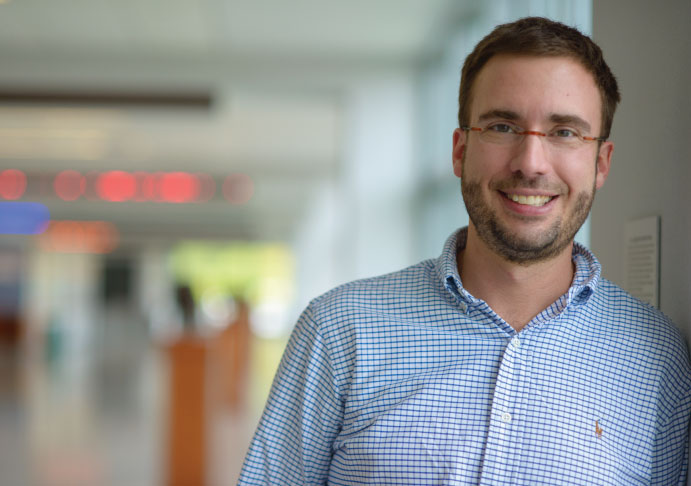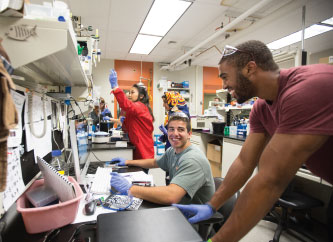Mountaintop Mentor - Bryan Berger

Brian Berger, assistant professor of chemical engineering at Lehigh, has made a big name for himself with research that sees him working “at the interface of biophysics and engineering.”
This summer, Berger is bringing his unique expertise to Mountaintop, where he is mentoring two groups of students. One of those groups is working on a project called “Integrating Molecular and Bioengineering Approaches to Address Challenges in Microbial Pathogenesis,” and will be co-mentored by Xuanhong Cheng from the department of materials science and engineering and Vassie Ware from the department of biological sciences. The other group will be tackling “Scalable and affordable nanoparticle synthesis for water purification in the developing world,” and will also draw on the expertise of Steve McIntosh and Mark Snyder from the department of chemical and biomolecular engineering.
With his groups just getting to work in early June, Berger checked in to share his thoughts on Mountaintop–and the opportunities the initiative provides not only for students, but faculty members as well.
How did you get involved with these particular student groups?
Vassie Ware and I had been discussing research for a while, and it kept coming back to projects we had going on separately in our labs, but both dealing with aspects of bacterial pathogenesis. We started kicking around ideas. Vassie was helping us with some biological techniques in engineering E. coli, and we helped her with electroporation of some bacterial samples. Eventually we converged on the idea of integrating our projects this summer around a common theme of looking at mycobacterium, which presents a whole series of unique challenges. For me, I have the chance to learn more about phage biology, which has a number of interesting aspects that could be relevant to treating multi-drug resistant infections- Vassie has been working on this for a long time. This summer is giving us both a chance to go after some ideas we had been discussing for awhile and were excited to pursue.
With Steve and Mark, we arrived at a similar kind of outcome. Steve and I had been working on using biological systems to synthesis nanostructured materials, with a focus on low-cost, high-yield methods to overcome current limitations of chemical synthesis as part of a NSF EFRI grant. One interesting application of this work is in photodegradation of organic pollutants from wastewater, where nanotechnology presents several potential solutions, though none are cost-effective for large-scale implementation. This is particularly important in communities where access to electricity or other resources may be limited; in other words, the solution needs to be both cost-effective and robust to a wide range of working environments. So we needed someone with expertise in materials synthesis (i.e., Mark), and the three of us decided to go for it.
What value does the physical space at Mountaintop do for this project in particular?
I think integrating students from chemical engineering, bioengineering, biochemistry and biological sciences is valuable for both of our teams. The kinds of problems we are trying to address are ones that are inherently multi-disciplinary, and they need both graduate and undergraduate students from the life sciences and engineering working together with faculty from both as well.
Educationally, I feel this experience is also very important, as inevitably many of these students may go on to careers in industries such as pharmaceuticals, biotechnology, alternative energy or advanced materials, where the teams they will be working in will be comprised of engineers, scientists and people with diverse backgrounds in general. Thus, working together in diverse teams with undergraduate students, graduate students and faculty across colleges is key to providing a cutting-edge education in engineering and science.
What challenges do you think your team will encounter during their project?
I think learning the experimental techniques will take time, but I also think the students are very motivated to learn and are working hard. Biological systems can also be unpredictable, particularly when we are trying to merge aspects of biology with engineered systems for a hybrid prototype, so we will likely encounter challenges this summer in producing the biological components necessary for our respective projects.
What hopes do you have for your teams’ outcomes?
I hope we can demonstrate feasibility for the concepts behind both projects. I think we can. I also hope several of these students will continue these projects as sponsored undergraduate research throughout the 2014-2015 academic year, so we can continue to build off of the success we have this summer.
Posted on:





